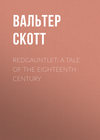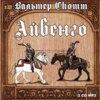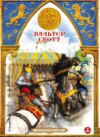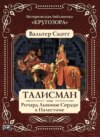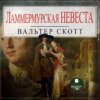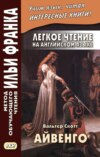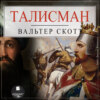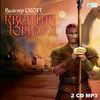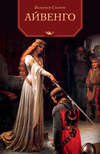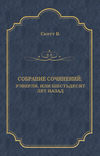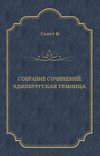Читать книгу: «Redgauntlet: A Tale Of The Eighteenth Century», страница 6
‘I trust thou art,’ said the Quaker; ‘but thou art the rather bound to be cautious in rashly affirming what thou wilt never execute. For I tell thee, friend, that though there is as great a difference between thee and one of our people as there is between a lion and a sheep, yet I know and believe thou hast so much of the lion in thee, that thou wouldst scarce employ thy strength and thy rage upon that which professeth no means of resistance. Report says so much good of thee, at least, if it says little more.’
‘Time will try,’ answered the fisherman; ‘and hark thee, Joshua, before we part I will put thee in the way of doing one good deed, which, credit me, is better than twenty moral speeches. Here is a stranger youth, whom Heaven has so scantily gifted with brains, that he will bewilder himself in the Sands, as he did last night, unless thou wilt kindly show him the way to Shepherd’s Bush; for I have been in vain endeavouring to make him comprehend the road thither. Hast thou so much charity under thy simplicity, Quaker, as to do this good turn?’
‘Nay, it is thou, friend,’ answered Joshua, ‘that dost lack charity, to suppose any one unwilling to do so simple a kindness.’
‘Thou art right – I should have remembered it can cost thee nothing. Young gentlemen, this pious pattern of primitive simplicity will teach thee the right way to the Shepherd’s Bush – aye, and will himself shear thee like a sheep, if you come to buying and selling with him.’
He then abruptly asked me, how long I intended to remain at Shepherd’s Bush.
I replied, I was at present uncertain – as long probably, as I could amuse myself in the neighbourhood.
‘You are fond of sport?’ he added, in the same tone of brief inquiry.
I answered in the affirmative, but added, I was totally inexperienced.
‘Perhaps if you reside here for some days,’ he said, ‘we may meet again, and I may have the chance of giving you a lesson.’
Ere I could express either thanks or assent, he turned short round with a wave of his hand by way of adieu, and rode back to the verge of the dell from which we had emerged together; and as he remained standing upon the banks, I could long hear his voice while he shouted down to those within its recesses.
Meanwhile the Quaker and I proceeded on our journey for some time in silence; he restraining his sober-minded steed to a pace which might have suited a much less active walker than myself, and looking on me from time to time with an expression of curiosity, mingled with benignity. For my part, I cared not to speak first. It happened I had never before been in company with one of this particular sect, and, afraid that in addressing him I might unwittingly infringe upon some of their prejudices or peculiarities, I patiently remained silent. At length he asked me, whether I had been long in the service of the laird, as men called him.
I repeated the words ‘in his service?’ with such an accent of surprise, as induced him to say, ‘Nay, but, friend, I mean no offence; perhaps I should have said in his society – an inmate, I mean, in his house?’
‘I am totally unknown to the person from whom we have just parted,’ said I, ‘and our connexion is only temporary. He had the charity to give me his guidance from the Sands, and a night’s harbourage from the tempest. So our acquaintance began, and there it is likely to end; for you may observe that our friend is by no means apt to encourage familiarity.’
‘So little so,’ answered my companion, ‘that thy case is, I think, the first in which I ever heard of his receiving any one into his house; that is, if thou hast really spent the night there.’
‘Why should you doubt it?’ replied I; ‘there is no motive I can have to deceive you, nor is the object worth it.’
‘Be not angry with me,’ said the Quaker; ‘but thou knowest that thine own people do not, as we humbly endeavour to do, confine themselves within the simplicity of truth, but employ the language of falsehood, not only for profit, but for compliment, and sometimes for mere diversion. I have heard various stories of my neighbour; of most of which I only believe a small part, and even then they are difficult to reconcile with each other. But this being the first time I ever beard of his receiving a stranger within his dwelling, made me express some doubts. I pray thee let them not offend thee.’
‘He does not,’ said I, ‘appear to possess in much abundance the means of exercising hospitality, and so may be excused from offering it in ordinary cases.’
‘That is to say, friend,’ replied Joshua, ‘thou hast supped ill, and perhaps breakfasted worse. Now my small tenement, called Mount Sharon, is nearer to us by two miles than thine inn; and although going thither may prolong thy walk, as taking thee of the straighter road to Shepherd’s Bush, yet methinks exercise will suit thy youthful limbs, as well as a good plain meal thy youthful appetite. What sayst thou, my young acquaintance?’
‘If it puts you not to inconvenience,’ I replied; for the invitation was cordially given, and my bread and milk had been hastily swallowed, and in small quantity.
‘Nay,’ said Joshua, ‘use not the language of compliment with those who renounce it. Had this poor courtesy been very inconvenient, perhaps I had not offered it.’
‘I accept the invitation, then,’ said I, ‘in the same good spirit in which you give it.’
The Quaker smiled, reached me his hand, I shook it, and we travelled on in great cordiality with each other. The fact is, I was much entertained by contrasting in my own mind, the open manner of the kind-hearted Joshua Geddes, with the abrupt, dark, and lofty demeanour of my entertainer on the preceding evening. Both were blunt and unceremonious; but the plainness of the Quaker had the character of devotional simplicity, and was mingled with the more real kindness, as if honest Joshua was desirous of atoning, by his sincerity, for the lack of external courtesy. On the contrary, the manners of the fisherman were those of one to whom the rules of good behaviour might be familiar, but who, either from pride or misanthropy, scorned to observe them. Still I thought of him with interest and curiosity, notwithstanding so much about him that was repulsive; and I promised myself, in the course of my conversation with the Quaker, to learn all that he knew on the subject. He turned the conversation, however, into a different channel, and inquired into my own condition of life, and views in visiting this remote frontier.
I only thought it necessary to mention my name, and add, that I had been educated to the law, but finding myself possessed of some independence, I had of late permitted myself some relaxation, and was residing at Shepherd’s Bush to enjoy the pleasure of angling.
‘I do thee no harm, young man,’ said my new friend, ‘in wishing thee a better employment for thy grave hours, and a more humane amusement (if amusement thou must have) for those of a lighter character.’
‘You are severe, sir,’ I replied. ‘I heard you but a moment since refer yourself to the protection of the laws of the country – if there be laws, there must be lawyers to explain, and judges to administer them.’
Joshua smiled, and pointed to the sheep which were grazing on the downs over which we were travelling. ‘Were a wolf,’ he said, ‘to come even now upon yonder flocks, they would crowd for protection, doubtless, around the shepherd and his dogs; yet they are bitten and harassed daily by the one, shorn, and finally killed and eaten by the other. But I say not this to shock you; for, though laws and lawyers are evils, yet they are necessary evils in this probationary state of society, till man shall learn to render unto his fellows that which is their due, according to the light of his own conscience, and through no other compulsion. Meanwhile, I have known many righteous men who have followed thy intended profession in honesty and uprightness of walk. The greater their merit, who walk erect in a path which so many find slippery.
‘And angling,’ said I: – ‘you object to that also as an amusement, you who, if I understood rightly what passed between you and my late landlord, are yourself a proprietor of fisheries.’
‘Not a proprietor,’ he replied, ‘I am only, in copartnery with others, a tacksman or lessee of some valuable salmon-fisheries a little down the coast. But mistake me not. The evil of angling, with which I class all sports, as they are called, which have the sufferings of animals for their end and object, does not consist in the mere catching and killing those animals with which the bounty of Providence hath stocked the earth for the good of man, but in making their protracted agony a principle of delight and enjoyment. I do indeed cause these fisheries to be conducted for the necessary taking, killing, and selling the fish; and, in the same way, were I a farmer, I should send my lambs to market. But I should as soon think of contriving myself a sport and amusement out of the trade of the butcher as out of that of the fisher.’
We argued the point no further; for though I thought his arguments a little too high-strained, yet as my mind acquitted me of having taken delight in aught but the theory of field-sports, I did not think myself called upon stubbornly to advocate a practice which had afforded me so little pleasure.
We had by this time arrived at the remains of an old finger-post, which my host had formerly pointed out as a landmark. Here, a ruinous wooden bridge, supported by long posts resembling crutches, served me to get across the water, while my new friend sought a ford a good way higher up, for the stream was considerably swelled.
As I paused for his rejoining me, I observed an angler at a little distance pouching trout after trout, as fast almost as he could cast his line; and I own, in spite of Joshua’s lecture on humanity, I could not but envy his adroitness and success, so natural is the love of sport to our minds, or so easily are we taught to assimilate success in field-sports with ideas of pleasure, and with the praise due to address and agility. I soon recognized in the successful angler little Benjie, who had been my guide and tutor in that gentle art, as you have learned from my former letters. I called – I whistled – the rascal recognized me, and, starting like a guilty thing, seemed hesitating whether to approach or to run away; and when he determined on the former, it was to assail me with a loud, clamorous, and exaggerated report of the anxiety of all at the Shepherd’s Bush for my personal safety; how my landlady had wept, how Sam and the ostler had not the heart to go to bed, but sat up all night drinking – and how he himself had been up long before daybreak to go in quest of me.
‘And you were switching the water, I suppose,’ said I, ‘to discover my dead body?’
This observation produced a long ‘Na – a – a’ of acknowledged detection; but, with his natural impudence, and confidence in my good nature, he immediately added, ‘that he thought I would like a fresh trout or twa for breakfast, and the water being in such a rare trim for the saumon raun, [The bait made of salmon-roe salted and preserved. In a swollen river, and about the month of October, it is a most deadly bait.] he couldna help taking a cast.’
While we were engaged in this discussion, the honest Quaker returned to the farther end of the wooden bridge to tell me he could not venture to cross the brook in its present state: but would be under the necessity to ride round by the stone bridge, which was a mile and a half higher up than his own house. He was about to give me directions how to proceed without him, and inquire for his sister, when I suggested to him that, if he pleased to trust his horse to little Benjie, the boy might carry him round by the bridge, while we walked the shorter and more pleasant road.
Joshua shook his head, for he was well acquainted with Benjie, who, he said, was the naughtiest varlet in the whole neighbourhood. Nevertheless, rather than part company, he agreed to put the pony under his charge for a short season, with many injunctions that he should not attempt to mount, but lead the pony (even Solomon) by the bridle, under the assurances of sixpence in case of proper demeanour, and penalty that if he transgressed the orders given him, ‘verily he would be scourged.’
Promises cost Benjie nothing, and he showered them out wholesale; till the Quaker at length yielded up the bridle to him, repeating his charges, and enforcing them by holding up his forefinger. On my part, I called to Benjie to leave the fish he had taken at Mount Sharon, making, at the same time, an apologetic countenance to my new friend, not being quite aware whether the compliment would be agreeable to such a condemner of field-sports.
He understood me at once, and reminded me of the practical distinction betwixt catching the animals as an object of cruel and wanton sport, and eating them as lawful and gratifying articles of food, after they were killed. On the latter point he had no scruples; but, on the contrary, assured me that this brook contained the real red trout, so highly esteemed by all connoisseurs, and that, when eaten within an hour of their being caught, they had a peculiar firmness of substance and delicacy of flavour, which rendered them an agreeable addition to a morning meal, especially when earned, like ours, by early rising, and an hour or two’s wholesome exercise.
But to thy alarm be it spoken, Alan, we did not come so far as the frying of our fish without further adventure. So it is only to spare thy patience, and mine own eyes, that I pull up for the present, and send thee the rest of my story in a subsequent letter.
LETTER VII
THE SAME TO THE SAME (In continuation.)
Little Benjie, with the pony, having been sent off on the left side of the brook, the Quaker and I sauntered on, like the cavalry and infantry of the same army occupying the opposite banks of a river, and observing the same line of march. But, while my worthy companion was assuring me of a pleasant greensward walk to his mansion, little Benjie, who had been charged to keep in sight, chose to deviate from the path assigned him, and, turning to the right, led his charge, Solomon, out of our vision.
‘The villain means to mount him!’ cried Joshua, with more vivacity than was consistent with his profession of passive endurance.
I endeavoured to appease his apprehensions, as he pushed on, wiping his brow with vexation, assuring him that, if the boy did mount, he would, for his own sake, ride gently.
‘You do not know him,’ said Joshua, rejecting all consolation; ‘HE do anything gently! – no, he will gallop Solomon – he will misuse the sober patience of the poor animal who has borne me so long! Yes, I was given over to my own devices when I ever let him touch the bridle, for such a little miscreant there never was before him in this country.’
He then proceeded to expatiate on every sort of rustic enormity of which he accused Benjie. He had been suspected of snaring partridges – was detected by Joshua himself in liming singing-birds – stood fully charged with having worried several cats, by aid of a lurcher which attended him, and which was as lean, and ragged, and mischievous, as his master. Finally, Benjie stood accused of having stolen a duck, to hunt it with the said lurcher, which was as dexterous on water as on land. I chimed in with my friend, in order to avoid giving him further irritation, and declared I should be disposed, from my own experience, to give up Benjie as one of Satan’s imps. Joshua Geddes began to censure the phrase as too much exaggerated, and otherwise unbecoming the mouth of a reflecting person; and, just as I was apologizing for it, as being a term of common parlance, we heard certain sounds on the opposite side of the brook, which seemed to indicate that Solomon and Benjie were at issue together. The sandhills behind which Benjie seemed to take his course, had concealed from us, as doubtless he meant they should, his ascent into the forbidden saddle, and, putting Solomon to his mettle, which he was seldom called upon to exert, they had cantered away together in great amity, till they came near to the ford from which the palfrey’s legitimate owner had already turned back.
Here a contest of opinions took place between the horse and his rider. The latter, according to his instructions, attempted to direct Solomon towards the distant bridge of stone; but Solomon opined that the ford was the shortest way to his own stable. The point was sharply contested, and we heard Benjie gee-hupping, tchek-tcheking, and, above all, flogging in great style; while Solomon, who, docile in his general habits, was now stirred beyond his patience, made a great trampling and recalcitration; and it was their joint noise which we heard, without being able to see, though Joshua might too well guess, the cause of it.
Alarmed at these indications, the Quaker began to shout out, ‘Benjie – thou varlet! Solomon – thou fool!’ when the couple presented themselves in full drive, Solomon having now decidedly obtained the better of the conflict, and bringing his unwilling rider in high career down to the ford. Never was there anger changed so fast into humane fear, as that of my good companion. ‘The varlet will be drowned!’ he exclaimed – ‘a widow’s son! – her only son! – and drowned! – let me go’ – And he struggled with me stoutly as I hung upon him, to prevent him from plunging into the ford.
I had no fear whatever for Benjie; for the blackguard vermin, though he could not manage the refractory horse, stuck on his seat like a monkey. Solomon and Benjie scrambled through the ford with little inconvenience, and resumed their gallop on the other side.
It was impossible to guess whether on this last occasion Benjie was running off with Solomon, or Solomon with Benjie; but, judging from character and motives, I rather suspected the former. I could not help laughing as the rascal passed me, grinning betwixt terror and delight, perched on the very pommel of the saddle, and holding with extended arms by bridle and mane while Solomon, the bit secured between his teeth, and his head bored down betwixt his forelegs, passed his master in this unwonted guise as hard as he could pelt.
‘The mischievous bastard!’ exclaimed the Quaker, terrified out of his usual moderation of speech – ‘the doomed gallows-bird! – he will break Solomon’s wind to a certainty.’
I prayed him to be comforted – assured, him a brushing gallop would do his favourite no harm and reminded him of the censure he had bestowed on me a minute before, for applying a harsh epithet to the boy.
But Joshua was not without his answer; ‘Friend youth,’ he said, ‘thou didst speak of the lad’s soul, which thou didst affirm belonged to the enemy, and of that thou couldst say nothing of thine own knowledge; on the contrary, I did but speak of his outward man, which will assuredly be suspended by a cord, if he mendeth not his manners. Men say that, young as he is, he is one of the laird’s gang.’
‘Of the laird’s gang!’ said I, repeating the words in surprise. ‘Do you mean the person with whom I slept last night? I heard you call him the laird. Is he at the head of a gang?’
‘Nay, I meant not precisely a gang,’ said the Quaker, who appeared in his haste to have spoken more than he intended – a company, or party, I should have said; but thus it is, friend Latimer, with the wisest men when they permit themselves to be perturbed with passion, and speak as in a fever, or as with the tongue of the foolish and the forward. And although thou hast been hasty to mark my infirmity, yet I grieve not that thou hast been a witness to it, seeing that the stumbles of the wise may be no less a caution to youth and inexperience, than is the fall of the foolish.’
This was a sort of acknowledgement of what I had already begun to suspect – that my new friend’s real goodness of disposition, joined to the acquired quietism of his religious sect, had been unable entirely to check the effervescence of a temper naturally warm and hasty.
Upon the present occasion, as if sensible he had displayed a greater degree of emotion than became his character, Joshua avoided further allusion to Benjie and Solomon, and proceeded to solicit my attention to the natural objects around us, which increased in beauty and interest, as, still conducted by the meanders of the brook, we left the common behind us, and entered a more cultivated and enclosed country, where arable and pasture ground was agreeably varied with groves and hedges. Descending now almost close to the stream, our course lay through a little gate, into a pathway kept with great neatness, the sides of which were decorated with trees and flowering shrubs of the hardier species; until, ascending by a gentle slope, we issued from the grove, and stood almost at once in front of a low but very neat building, of an irregular form; and my guide, shaking me cordially by the hand, made me welcome to Mount Sharon.
The wood through which we had approached this little mansion was thrown around it both on the north and north-west, but, breaking off into different directions, was intersected by a few fields well watered and sheltered. The house fronted to the south-east, and from thence the pleasure-ground, or, I should rather say, the gardens, sloped down to the water. I afterwards understood that the father of the present proprietor had a considerable taste for horticulture, which had been inherited by his son, and had formed these gardens, which, with their shaven turf, pleached alleys, wildernesses, and exotic trees and shrubs, greatly excelled anything of the kind which had been attempted in the neighbourhood.
If there was a little vanity in the complacent smile with which Joshua Geddes saw me gaze with delight on a scene so different from the naked waste we had that day traversed in company, it might surely be permitted to one who, cultivating and improving the beauties of nature, had found therein, as he said, bodily health, and a pleasing relaxation for the mind. At the bottom of the extended gardens the brook wheeled round in a wide semicircle, and was itself their boundary. The opposite side was no part of Joshua’s domain, but the brook was there skirted by a precipitous rock of limestone, which seemed a barrier of nature’s own erecting around his little Eden of beauty, comfort, and peace.
‘But I must not let thee forget,’ said the kind Quaker, ‘amidst thy admiration of these beauties of our little inheritance, that thy breakfast has been a light one.’
So saying, Joshua conducted me to a small sashed door, opening under a porch amply mantled by honeysuckle and clematis, into a parlour of moderate size; the furniture of which, in plainness and excessive cleanliness, bore the characteristic marks of the sect to which the owner belonged.
Thy father’s Hannah is generally allowed to be an exception to all Scottish housekeepers, and stands unparalleled for cleanliness among the women of Auld Reekie; but the cleanliness of Hannah is sluttishness compared to the scrupulous purifications of these people, who seem to carry into the minor decencies of life that conscientious rigour which they affect in their morals.
The parlour would have been gloomy, for the windows were small and the ceiling low; but the present proprietor had rendered it more cheerful by opening one end into a small conservatory, roofed with glass, and divided from the parlour by a partition of the same. I have never before seen this very pleasing manner of uniting the comforts of an apartment with the beauties of a garden, and I wonder it is not more practised by the great. Something of the kind is hinted at in a paper of the SPECTATOR.
As I walked towards the conservatory to view it more closely, the parlour chimney engaged my attention. It was a pile of massive stone, entirely out of proportion to the size of the apartment. On the front had once been an armorial scutcheon; for the hammer, or chisel, which had been employed to deface the shield or crest, had left uninjured the scroll beneath, which bore the pious motto, ‘TRUST IN GOD.’ Black-letter, you know, was my early passion, and the tombstones in the Greyfriars’ churchyard early yielded up to my knowledge as a decipherer what little they could tell of the forgotten dead.
Joshua Geddes paused when he saw my eye fixed on this relic of antiquity. ‘Thou canst read it?’ he said.
I repeated the motto, and added, there seemed vestiges of a date.
‘It should be 1537,’ said he; ‘for so long ago, at the least computation, did my ancestors, in the blinded times of Papistry, possess these lands, and in that year did they build their house.’
‘It is an ancient descent,’ said I, looking with respect upon the monument. ‘I am sorry the arms have been defaced.’
It was perhaps impossible for my friend, Quaker as he was, to seem altogether void of respect for the pedigree which he began to recount to me, disclaiming all the while the vanity usually connected with the subject; in short, with the air of mingled melancholy, regret, and conscious dignity, with which Jack Fawkes used to tell us at college of his ancestor’s unfortunate connexion with the Gunpowder Plot.
‘Vanity of vanities, saith the Preacher,’ thus harangued Joshua Gleddes of Mount Sharon; ‘if we ourselves are nothing in the sight of Heaven, how much less than nothing must be our derivation from rotten bones and mouldering dust, whose immortal spirits have long since gone to their private account? Yes, friend Latimer, my ancestors were renowned among the ravenous and bloodthirsty men who then dwelt in this vexed country; and so much were they famed for successful freebooting, robbery, and bloodshed, that they are said to have been called Geddes, as likening them to the fish called a Jack, Pike, or Luce, and in our country tongue, a GED – a goodly distinction truly for Christian men! Yet did they paint this shark of the fresh waters upon their shields, and these profane priests of a wicked idolatry, the empty boasters called heralds, who make engraven images of fishes, fowls, and four-footed beasts, that men may fall down and worship them, assigned the ged for the device and escutcheon of my fathers, and hewed it over their chimneys, and placed it above their tombs; and the men were elated in mind, and became yet more ged-like, slaying, leading into captivity, and dividing the spoil, until the place where they dwelt obtained the name of Sharing-Knowe, from the booty which was there divided amongst them and their accomplices. But a better judgement was given to my father’s father, Philip Geddes, who, after trying to light his candle at some of the vain wildfires then held aloft at different meetings and steeple-houses, at length obtained a spark from the lamp of the blessed George Fox, who came into Scotland spreading light among darkness, as he himself hath written, as plentifully as fly the sparkles from the hoof of the horse which gallops swiftly along the stony road.’ – Here the good Quaker interrupted himself with, ‘And that is very true, I must go speedily to see after the condition of Solomon.’
A Quaker servant here entered the room with a tray, and inclining his head towards his master, but not after the manner of one who bows, said composedly, ‘Thou art welcome home, friend Joshua, we expected thee not so early; but what hath befallen Solomon thy horse?’
‘What hath befallen him, indeed?’ said my friend; ‘hath he not been returned hither by the child whom they call Benjie?’
‘He hath,’ said his domestic, ‘but it was after a strange fashion; for he came hither at a swift and furious pace, and flung the child Benjie from his back, upon the heap of dung which is in the stable-yard.’
‘I am glad of it,’ said Joshua, hastily, – ‘glad of it, with all my heart and spirit! But stay, he is the child of the widow – hath the boy any hurt?’
‘Not so’ answered the servant, ‘for he rose and fled swiftly.’
Joshua muttered something about a scourge, and then inquired after Solomon’s present condition.
‘He seetheth like a steaming cauldron,’ answered the servant; ‘and Bauldie, the lad, walketh him about the yard with a halter, lest he take cold.’
Mr. Geddes hastened to the stable-yard to view personally the condition of his favourite, and I followed to offer my counsel as a jockey. Don’t laugh, Alan, sure I have jockeyship enough to assist a Quaker – in this unpleasing predicament.
The lad who was leading the horse seemed to be no Quaker, though his intercourse with the family had given him a touch of their prim sobriety of look and manner. He assured Joshua that his horse had received no injury, and I even hinted that the exercise would be of service to him. Solomon himself neighed towards his master, and rubbed his head against the good Quaker’s shoulder, as if to assure him of his being quite well; so that Joshua returned in comfort to his parlour, where breakfast was now about to be displayed.
I have since learned that the affection of Joshua for his pony is considered as inordinate by some of his own sect; and that he has been much blamed for permitting it to be called by the name of Solomon, or any other name whatever; but he has gained so much respect and influence among them that they overlook these foibles.
I learned from him (whilst the old servant, Jehoiachim, entering and re-entering, seemed to make no end of the materials which he brought in for breakfast) that his grandfather Philip, the convert of George Fox, had suffered much from the persecution to which these harmless devotees were subjected on all sides during that intolerant period, and much of their family estate had been dilapidated. But better days dawned on Joshua’s father, who, connecting himself by marriage with a wealthy family of Quakers in Lancashire, engaged successfully in various branches of commerce, and redeemed the remnants of the property, changing its name in sense, without much alteration of sound, from the Border appellation of Sharing-Knowe, to the evangelical appellation of Mount Sharon.
Покупайте книги и получайте бонусы в Литрес, Читай-городе и Буквоеде.
Участвовать в бонусной программе
